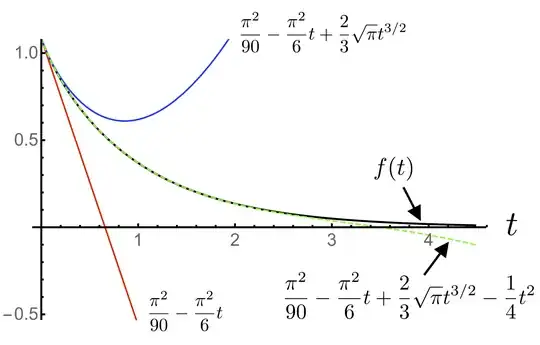In doing some calculations related to one-dimensional Brownian Motion confined to a finite interval, I have come across functions such as
$$ f(t) = \sum_{n=1}^\infty\frac{\exp(-n^2t)}{n^4}. $$ I am interested in the behavior of this function for small $t$. By expanding the exponential it is easy to get the terms of order 0 and 1 in $t$. However, the term of order $t^2$ diverges. I take this to mean that $f(t)$ does not have a second derivative at $t = 0$. I think (although I'm not sure) that in some sense there is a "3/2" order term. How does one define and calculate this term? Perhaps the limit $$ \lim_{t \to 0}\frac{f(t) - f(0) - t f'(0)}{t^{3/2}} $$ is finite and can be calculated? Is there an unambiguous way of expanding such functions in power series with fractional powers?
Background: Consider a particle undergoing one-dimensional Brownian Motion in the interval $\left[0,L\right]$ with reflecting boundary conditions. The particle has diffusion coefficient $D$ and its position is $x(t)$. Its initial position is distributed uniformly in the interval. Then one can show that the mean squared displacement at time $t$ is $$ \text{MSD}(t) \equiv \langle \left[x(t) - x(0)\right]^2\rangle = \frac{L^2}{6} + \frac{8 L^2}{\pi^4}\sum_{n=1}^\infty\frac{-1 + (-1)^n}{n^4} \cdot \exp(-t/\tau_n), $$ where $$ \tau_n = \frac{L^2}{n^2 \pi^2 D} $$ As I mentioned, one can calculate this up to first order in $t$. The constant term is of course zero (the particle can't travel any distance in zero time) and the first order term turns out to be $2 D t$, which makes sense since this is the MSD of a free particle (i.e. before it encounters any walls).
Further Notes
Here is a plot of the function $f(t)$ given by the series, as well as the approximations from Marko Riedel's answer:
